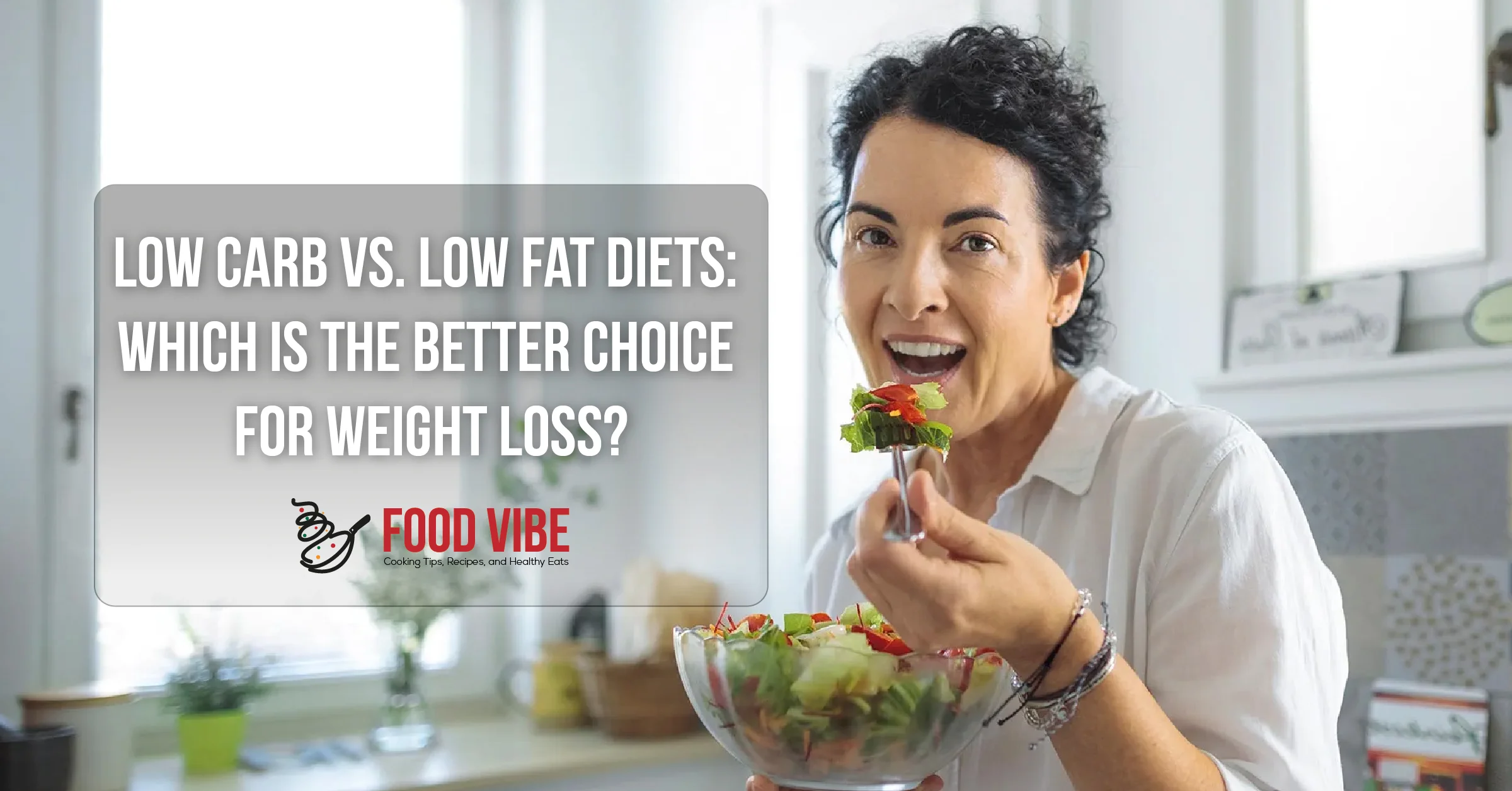Low Carb vs. Low Fat Diets: Which Is the Better Choice for Weight Loss?
Choosing between low carb and low fat diets for weight loss can be tough. Both have their good points. Knowing the differences helps you decide what’s best for you.
The low carb diet is known for quick weight loss and better blood sugar control. It’s a popular choice for many.
Looking into weight loss, you’ll hear a lot about low carb vs. low fat diets. The aim is to pick the diet that fits your life and goals. By weighing the pros and cons, you can choose the diet that helps you lose weight effectively.
Table of Contents
Understanding the Basics of Diet-Based Weight Loss
Two diets are often talked about for weight loss: low carb and low fat. It’s key to know the basics of each to decide which is better. A low carb diet limits carbs like sugars and starches. A low fat diet cuts down on fat intake.
Both diets have good and bad points. Knowing about macronutrients like carbs, protein, and fat is important. Low carb diets can lead to more weight loss and better blood sugar control. Low fat diets may lower heart disease and cancer risks.
Defining Low-Carb and Low-Fat Diets
To figure out which diet is best for losing weight, let’s look at their main features. Low-carb diets limit carbs to 50-150 grams a day. Low-fat diets keep fat intake under 30% of daily calories.
The Role of Macronutrients
Macronutrients are key for weight loss. Carbs give energy, protein fixes muscles, and fat helps absorb vitamins and minerals. Knowing how these nutrients work together is crucial for losing weight.
By looking at the benefits of low carb and low fat diets, you can choose the right one for you. Always talk to a doctor before starting a new diet.
The Science Behind Low Carb vs. Low Fat Diets — Which Is Best for Weight Loss?
Two diets are often compared for weight loss: low carb vs low fat. Understanding the science behind each is key. Both can help with weight loss, but the right choice depends on your body and lifestyle.
A low-carb diet limits carbs like sugars and starches. A low-fat diet cuts down on fats. Each diet has its benefits and drawbacks. Your health goals, diet preferences, and lifestyle play a big role in your choice.
Here are some key points to consider when comparing low carb and low fat diets:
- Low-carb diets are rich in protein and fat, helping with fullness and weight loss.
- Low-fat diets are high in carbs and fiber, aiding digestion and health.
- Both diets can lead to weight loss, but low-carb diets might have an advantage in the short term.
The best diet for weight loss is one that fits your needs and preferences. By understanding the science, you can choose the diet that suits you best.
| Diet | Macronutrient Breakdown | Pros | Cons |
|---|---|---|---|
| Low-Carb | High protein, high fat, low carbohydrate | Effective for short-term weight loss, improved blood sugar control | May be difficult to follow, restrictive food choices |
| Low-Fat | High carbohydrate, low fat, moderate protein | May be more sustainable, higher in fiber and nutrients | May not be as effective for short-term weight loss, higher in carbohydrates |
Metabolic Effects of Each Diet Approach
Understanding how your body handles different nutrients is key for weight loss. The debate between low carb and low fat diets reveals their unique effects. Your body’s fat burning and blood sugar control depend on your diet choice.
Your body’s processing of carbs and fats affects your weight loss success. A low-carb diet can better control blood sugar and boost fat burning. This makes it a favorite for those looking to lose weight. Meanwhile, a low-fat diet may lower heart disease risk by reducing cholesterol, which is good for overall health.

How Your Body Processes Carbohydrates
Carbs turn into glucose, which gives your body energy. A low-carb diet forces your body to use fat for energy instead. This can lead to more fat burning and better blood sugar control, making low-carb diets popular for weight loss.
Fat Metabolism and Weight Loss
Fat metabolism is vital for losing weight. A low-fat diet might not help your body burn fat as well, slowing down weight loss. But, a low-carb diet can enhance fat burning, making it a better choice for shedding pounds. Research shows that your diet choice significantly affects fat burning and weight loss.
Common Myths and Misconceptions About Both Diets
When you think about a low carb diet or a low fat diet, it’s key to know the truth. Many myths surround these diets, making it hard to choose the right one. Knowing the benefits of each can help you decide wisely.
Some myths say low carb diets are too strict or lack important nutrients. But, a well-planned low carb diet can give you all the nutrients you need. Low fat diets, on the other hand, are often seen as too lenient, leading to eating too many carbs. Yet, a balanced low fat diet can help you lose weight and get healthier.
Here are some important things to think about when looking at low carb and low fat diets:
- Low carb diets can help with weight loss and better blood sugar control
- Low fat diets can lower heart disease and cancer risks
- Both diets need careful planning to get enough nutrients
- Always talk to a healthcare expert or dietitian before starting a new diet
By knowing the benefits of low carb and low fat diets, you can choose the best one for you. Always talk to a healthcare professional before starting any new diet or exercise plan.
Health Benefits Beyond Weight Loss
When looking at low carb vs low fat for fat loss, don’t just focus on the number on the scale. Both diets offer many health benefits. They can improve your heart health and even help you think clearer. As you compare low carb and low fat diets, think about how they affect your health in the long run.
A low carb diet can make your heart healthier by lowering bad fats and raising good ones. Meanwhile, a low fat diet might lower cancer risks. It’s important to look at the benefits of each diet and what you need for your health.
Some key benefits of each diet include:
- Improved blood sugar control
- Increased energy levels
- Enhanced mental clarity and focus
When you’re deciding between low carb vs low fat for fat loss, remember to focus on your overall health. Choose a diet that fits your lifestyle and health goals. This way, you can lose weight in a way that’s good for you in the long run. When you compare low carb and low fat diets, think about what each offers and pick what’s best for you.

Potential Drawbacks and Side Effects
When thinking about a low carb diet or a low fat diet, knowing the potential drawbacks is key. Both diets offer benefits like weight loss and better health. But, they can also cause nutrient deficiencies if not done right. For example, a low-carb diet might lack important vitamins and minerals. A low-fat diet might lead to more refined carbs.
Side effects of a low-carb diet include fatigue, headaches, and constipation. A low-fat diet might increase the risk of heart disease because of high carb intake. It’s important to consider these risks against the diet’s benefits to choose wisely.
To avoid side effects, consider these tips:
- Eat a balanced diet with lots of whole foods
- Get advice from a healthcare professional or registered dietitian for a personalized meal plan
- Watch how your body reacts to the diet and adjust as needed
Knowing the potential drawbacks and side effects helps you choose the right diet. This way, you can enjoy the benefits of both diets while avoiding the risks.
Food Choices and Meal Planning
Choosing the right foods is key when deciding between low carb vs low fat diets. The best diet for you depends on your personal needs and likes. It’s important to know the food options for each diet to begin.
A low-carb diet means eating less carbs like sugary foods, bread, and pasta. You’ll eat more protein and healthy fats. A low-fat diet cuts down on fatty foods like oils, butter, and fatty meats. You’ll eat more whole grains, fruits, and veggies instead.
Low-Carb Diet Food List
- Leafy greens, such as spinach and kale
- Protein-rich foods, such as chicken, fish, and eggs
- Healthy fats, such as avocado and nuts
Low-Fat Diet Food Options
- Whole grains, such as brown rice and quinoa
- Fruits, such as apples and berries
- Vegetables, such as broccoli and carrots
By picking the right foods and planning meals, you can succeed with low carb vs low fat diets. Always talk to a healthcare pro or dietitian to find the best diet for you.
| Diet | Food Options | Sample Meal Plan |
|---|---|---|
| Low-Carb | Protein-rich foods, healthy fats | Grilled chicken with avocado and vegetables |
| Low-Fat | Whole grains, fruits, vegetables | Whole grain pasta with marinara sauce and steamed vegetables |
Exercise Compatibility and Performance
When picking a weight loss diet, think about how it will change your exercise routine. Low carb vs low fat research shows each diet has its own good and bad points for energy and sports performance. To choose a weight loss diet that fits your life, think about your exercise goals and likes.
If you love high-intensity interval training, a low-carb diet might help you. But, if you’re into long-distance sports, a low-fat diet could be better. It’s key to know how each diet affects your energy and how well you perform. Here are some important things to remember:
- Low-carb diets can help burn more fat and improve focus, which is good for intense workouts.
- Low-fat diets give quick energy, making them great for long activities like running or biking.
- It’s important to listen to your body and adjust your diet and workouts to avoid getting tired or doing poorly.
Finding the right balance between diet and exercise is key to success. By thinking about your lifestyle, likes, and goals, you can pick the best diet for you. Always talk to a healthcare expert or a dietitian to find what’s best for you.

Sustainability and Long-Term Success Rates
Choosing the right diet for weight loss is key. Both low carb and low fat diets have their ups and downs. The secret to success is finding a diet you can stick with for a long time. Research suggests that low-carb diets might be harder to keep up with, while low-fat diets are more flexible.
Adherence is a big factor in diet success. Diets with high adherence rates tend to work better in the long run. Lifestyle factors like work, family, and social life also matter a lot. A diet that fits easily into your life is more likely to succeed.
Strategies for Long-Term Success
- Set realistic goals and expectations
- Find a diet that fits your lifestyle and preferences
- Seek support from friends, family, or a support group
- Monitor your progress and make adjustments as needed
Finding a balance between low carb and low fat diets is important. A diet that combines both might work best. By thinking about your lifestyle and how well you can stick to a diet, you can choose the best one for you. This increases your chances of success in the long run.
| Diet Type | Adherence Rate | Long-Term Success Rate |
|---|---|---|
| Low-Carb Diet | 60-70% | 40-50% |
| Low-Fat Diet | 70-80% | 50-60% |
Who Should Choose Which Diet?
Choosing between a low carb diet and a low fat diet depends on your needs and goals. Both diets offer benefits. For example, a low carb diet can help control blood sugar levels. On the other hand, a low fat diet may lower your risk of heart disease.
Think about these points when making your choice:
- Health status: A low carb diet might be better for those with type 2 diabetes. But, a low fat diet could be better for people with high cholesterol.
- Food preferences: If you like meat and dairy, a low carb diet might suit you. A low fat diet could be better if you prefer plant-based foods.
- Lifestyle: A low fat diet might be easier for busy people. It often requires less planning and cooking.
Success comes from choosing a diet you can stick to long-term. Consider your lifestyle, food likes, and health goals. Pick the diet that fits these best. This way, you can enjoy the health benefits of either diet.
| Diet | Benefits | Drawbacks |
|---|---|---|
| Low Carb Diet | Improved blood sugar control, weight loss | Restrictive, may be low in certain nutrients |
| Low Fat Diet | Reduced risk of heart disease, weight loss | May be low in certain nutrients, restrictive |
Conclusion:
Exploring low-carb and low-fat diets shows there’s no single best way to lose weight. Your choice depends on your needs, likes, and lifestyle. Pick a diet that fits your life and you can stick to it for the long haul.
Low-carb and low-fat diets each have their good and bad sides. Think about your health goals, what you like to eat, and your overall health. The best diet is one you can follow and enjoy for a long time.
Starting your weight loss journey? Be patient and kind to yourself. Be ready to change your approach if needed. With the right attitude and a bit of experimentation, you’ll find the diet that works for you. Here’s to your success!
Also Read: Delicious & Low-Calorie Recipes for Your Diet
FAQs
What is the main difference between low-carb and low-fat diets?
Low-carb diets focus on reducing carbohydrate intake, while low-fat diets limit fat consumption, each offering unique benefits for weight loss and health.
Which diet is better for quick weight loss?
Low-carb diets are often more effective for short-term weight loss due to improved fat-burning and blood sugar control.
Can a low-fat diet reduce the risk of heart disease?
Yes, low-fat diets may lower heart disease risk by reducing cholesterol levels, especially when paired with healthy, whole-food choices.
Are low-carb diets sustainable long-term?
Low-carb diets can be sustainable if tailored to your preferences and lifestyle, though they may require more planning and adjustment compared to low-fat diets.
How do I choose between low-carb and low-fat diets?
Consider your health goals, food preferences, and lifestyle. For example, choose low-carb for blood sugar control or low-fat for heart health and flexibility. Always consult a healthcare professional for personalized advice.














Post Comment